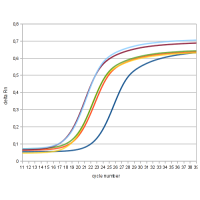
Who can this help?
What does it do?
Why should I choose it?
Which genes are covered?
MGP-4 DNA (Hotspot SNVs & Small Indels): AKT1, ALK, BRAF, CCNE1, CDK4, CDK6, CDKN2A, CTNNB1, CXCR4, EGFR, ERBB2, ESR1, FBXW7, FGFR1, FGFR2, FGFR3, GNA11, GNAQ, GNAS, HRAS, IDH1, IDH2, KIT, KRAS, MAP2K1, MET, MTOR, MYD88, NRAS, NTRK1, NTRK3, PDGFRA, PIK3CA, POLD1, POLE, PTEN, RET, ROS1, SMAD4, STK11, TP53
MGP-4 DNA (Copy Number Gains – ‘CNGs’): EGFR, ERBB2, KIT, KRAS, MET, PIK3CA
MGP-4 RNA (Gene Fusions): ABL1, AKT3, ALK*, AXL, BRAF, EGFR, ERBB2, ERG, ETV1, ETV4, ETV5, FGFR1, FGFR2, FGFR3, MET, NTRK1*, NTRK2, NTRK3*, PDGFRA, PPARG, RAF1, RET*, ROS1*
*Validated for clinical use, all other gene fusions are for research use only (RUO). Also note that for reasons of clarity, fusion partners are not shown above, please click here to see the full list.

MGP-5: An NGS-based test, looking at tumour derived DNA, to help guide PARP inhibitor use
Who can this help?
What does it do?
Why should I choose it?
Which genes are covered?
MGP-5: ATM, BARD1, BRCA1, BRCA2, BRIP1, CDK12, CHEK2, FANCD2, MRE11, NBN, PALB2, PPP2R2A, TP53, RAD51B, RAD54L

Rapid-turnaround tests, looking at selected biomarkers only to help guide key personalised therapy options
Who can these help?
What do they do?
Why should I choose one?
Which genetic changes are covered?
BRAF: Common variants at codon 600
KRAS: Common variants at codons 12, 13, 59, 61, 117, 146
NRAS: Common variants at codons 12, 13, 59, 61, 117
EGFR: Common variants at codons 719, 768, 790, 858, 861 & Common exon 19 deletions/exon 20 insertions
LUNG FUSIONS: Common intergenic gene rearrangements (fusions) involving ALK/ROS1/RET, plus intragenic gene rearrangement (exon 14 skipping) in MET.
MICRO-SATELLITE INSTABILITY (MSI): Looks for instability in 7 repetitive DNA sequences, as a marker of mismatch repair deficiency, which is a potential indication for immune Check Point Inhibitor (CPI) therapy in patients with advanced solid tumours.
Full details of exactly what is encompassed by our gene panel (and retired legacy panels), including downloadable lists of all the variants evaluated, can be found on our NGS Assay Details page.
Other tests currently available for clinical use:
1) MSI & MLH-1 promoter methylation analysis
Both these tests, which were designed for use in accordance with the latest NICE and ACGS guidelines relating to Lynch Syndrome pre-screening, are available upon demand. The MSI assay is also suitable for use in identifying patients with advanced solid tumours who may benefit from immune Check Point Inhibitor (CPI) therapy.
2) Endopredict test (Myriad Genetics)
This test, produced by Myriad Genetics, but performed in-house at Sarah Cannon, is designed to assess the 10 year risk of distant breast cancer recurrence, and thus permit an evaluation of the relative risks/benefits of utilising chemotherapy after surgery to remove the primary tumour.
What’s in development?
1) Improved partner agnostic gene fusion detection
More recently targetable fusions such as the NTRKs and specifically the FGFRs have now been shown to have a much more diverse range of fusions partners that the more familiar ALK, ROS1 and RET. We are working to ensure that we can reliably detect as many of these (ideally all, via a partner agnostic solution) as possible.

